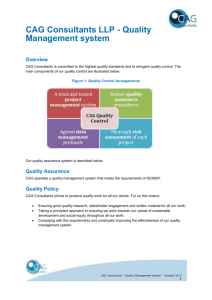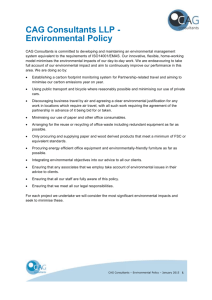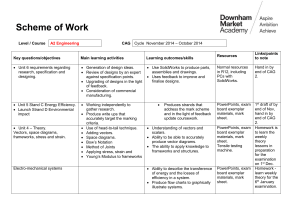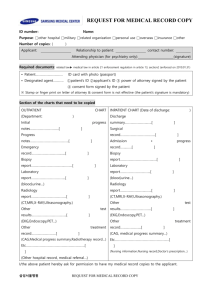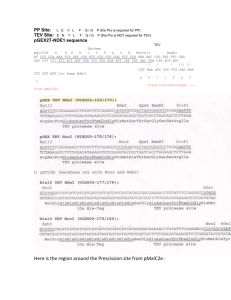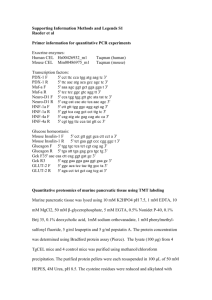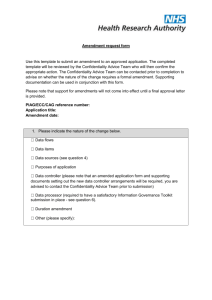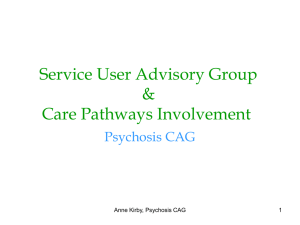CAG Member information pack July 2015
advertisement
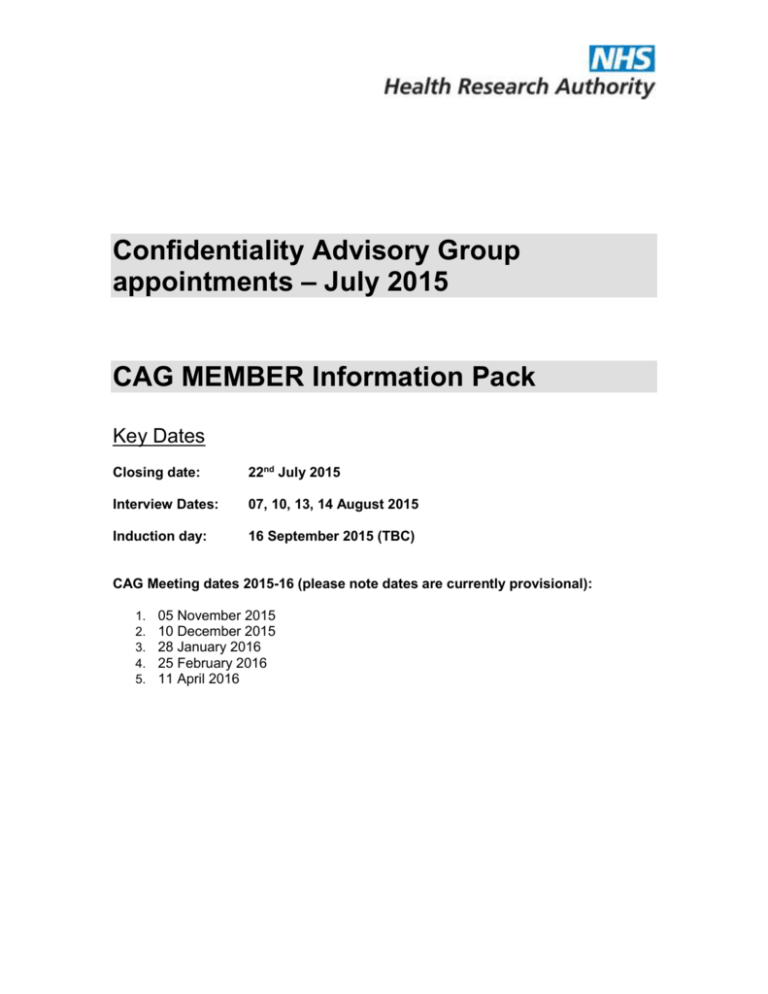
Confidentiality Advisory Group appointments – July 2015 CAG MEMBER Information Pack Key Dates Closing date: 22nd July 2015 Interview Dates: 07, 10, 13, 14 August 2015 Induction day: 16 September 2015 (TBC) CAG Meeting dates 2015-16 (please note dates are currently provisional): 1. 2. 3. 4. 5. 05 November 2015 10 December 2015 28 January 2016 25 February 2016 11 April 2016 A Message from Dr Mark Taylor, Establishing Chair of the Confidentiality Advisory Group and Dr Janet Wisely, Chief Executive of the Health Research Authority Dear applicant, Thank you for considering being a member of the Confidentiality Advisory Group. The work of the Group is challenging but also immensely important. We will require a wide range of perspectives, both expert and lay, to provide the balanced and independent advice that is needed. As I am sure you already know, the Group provides advice to the Health Research Authority and the Secretary of State for Health on the use of legal powers (established by regulations made under section 251 of the NHS Act 2006) to set aside the common law duty of confidence and facilitate access to confidential patient information, for a range of research and non-research medical purposes, without patient consent. The CAG will also be taking on new responsibilities under the Care Act 2014 to advise the Health & Social Care Information Centre on its dissemination decisions. The Secretary of State will take decisions on non-research applications but has delegated decisions to the Health Research Authority in relation to applications for disclosure for research purposes in England. Any access to confidential patient records, containing sensitive personal information confided at what can be moments of great personal vulnerability, is a privilege. Access without a patient’s consent is a special privilege. The Confidentiality Advisory Group carefully considers applications and advises on whether the criteria established in law and developed principles are satisfied. It will also be advising against a new set of Regulations (pending) that will set out factors the CAG should take into account. If trust in the confidentiality of healthcare is to be upheld, then access can only be supported if it is shown to be in the public interest. This will involve, amongst other considerations, a careful balancing of patient privacy with the improvements in care and healthcare planning that might follow access. It is certain that, sometimes, advice will support important medical research that could not otherwise take place. Sometimes, it will support data-flows that will improve the quality of care in the NHS for each or any one of us. It will also, sometimes, advise against disclosure when the case for setting aside a patient’s right to confidentiality has not been made. The work of the Group is not easy. Sound advice will rely upon a broad range of perspectives being brought into careful and conscientious consideration. It is, however, an immensely rewarding and satisfying process. I look forward to the possibility of working with you. With kind regards, Dr Mark Taylor Dr Janet Wisely CAG members - Information Pack 2015 2 Background The Health Research Authority (HRA) is a non-departmental public body and the main objective of the HRA in exercising its functions is to protect participants and potential participants in health or social care research and the general public by encouraging research that is safe and ethical, and to promote the interests of those participants and potential participants and the general public by facilitating the conduct of research that is safe and ethical (including by promoting transparency in research). In September 2012 the Department of Health announced that functions to advise on the use of confidential patient information without consent, according to regulations made under section 251 of the NHS Act 2006, would transfer to the HRA from the National Information Governance Board (NIGB) on 01 April 2013. This transfer included the NIGB's Ethics and Confidentiality Committee (ECC), which previously carried out the advisory function. The HRA convened a panel known as the Confidentiality Advisory Group (CAG) to deliver the advisory function. Dr Mark Taylor was appointed as Establishing Chair to support the transition and development and currently continues in post. The HRA has approval functions as they relate to research in England. The decisions on use data of outside of England for research will remain with the Secretary of State for Health. Under the Care Act 2014, the HRA, via the CAG, has been provided with a new responsibility to advise the HSCIC on “any publication or other dissemination by the HSCIC of information which is in a form which identifies an individual …or enables the identity of such an individual to be ascertained”. This is a new responsibility has been developed as a package of government measures to help improve public confidence in the appropriate handling of information and the CAG is intended to act as a form of transparent peer review for the HSCIC decisions on dissemination when the function comes into effect. This is a new role for the CAG and the HSCIC must have regard to any advice provided. We are looking to recruit up to ten members to form part of the CAG to deliver all aspects of its functions. CAG members - Information Pack 2015 3 Role of the Confidentiality Advisory Group From April 2013 the responsibility for co-ordinating the Section 251 function of the NHS Act 2006 and the Health Service (Control of Patient Information) Regulations 2002 transferred from the National Information Governance Board (NIGB) to the Health Research Authority (HRA). The HRA has remit to approve research applications and the Department of Health, on behalf of the Secretary of State for Health, will retain the approval decision for all non-research applications. The Confidentiality Advisory Group (CAG) has been set up by the Health Research Authority to provide transparent and independent advice to the HRA and the SofS to support their approval decisions. The CAG is an independent group that provides expert advice to the Health Research Authority and the Secretary of State for Health on whether an application should be approved. This advisory recommendation is provided in the context of the Health Service (Control of Patient Information) Regulations 2002. The applications that CAG advise upon relate to access to confidential patient information without consent (e.g. identifiable information generated within a healthcare setting) for medical purposes other than direct patient care. These purposes include medical research, health surveillance, public health, national clinical audit, service evaluation, and national data collections. Applicants include academic research institutions, the NHS, government organisations and commercial partnerships. The role of the Group is to review each application, and to advise on whether there is sufficient justification to access the requested confidential patient information without patient consent. Applicants must provide sufficient evidence to demonstrate that consent is not feasible and access to pseudonymised data would not be sufficient to achieve the purposes. The key purpose of the CAG is to promote and protect the interests of the patient whilst at the same time facilitating appropriate secondary use activities. CAG members will receive some training on the legal framework and have opportunities to debate and advise on challenging issues at a national level; all the while focused on achieving clear outcomes. Qualities required for the role Membership of the CAG will be drawn from a range of backgrounds however we are looking for people who are passionate and committed to the role of the CAG, who are able to work effectively and collaboratively, support the function it delivers and are able to deliver a balanced recommendation. The CAG would welcome applications from anyone who meets the criteria including members of the public, representatives of patients, members of consumer groups, health care professions and professional regulatory bodies and academic/ research institutions. The Health Research Authority CAG members - Information Pack 2015 4 are particularly interested in applicants with experience in public health issues, lay membership, mental capacity and the use of general practitioner generated data. The successful applicants will already have, or be willing to develop, an understanding of clinical or health service research, application of the common law duty of confidentiality, patient consent and use of Section 251; knowledge of information governance and research processes and an understanding of the current issues currently impacting on use of information within the NHS and other sectors including social care. The CAG will be particularly interested in applicants who can demonstrate expertise in the following areas: Independent lay voice Practical experience gained within social care and/or local authorities with understanding of issues around integrated care and research Commissioning Practising clinicians in hospital and general practice, voluntary and third sector Experience in dealing with mental capacity issues Experience in dealing with mental health issues The ability to apply legal reasoning to practical scenarios within advice recommendations Senior level experience gained within public health Epidemiology expertise Relevant legal knowledge and experience Expertise and experience in Information Governance Clinical and health research methodology expertise Experience working in private/commercial sector Experience in the issues around use of GP data Research ethics experience To help you decide if you wish to apply for appointment for the role of CAG member, we have listed below the main responsibilities, and the criteria that will be applied when assessing candidates. To be considered, you must be able to demonstrate within the application form that you have the qualities, skills and experience to meet the essential criteria Role Description The main responsibilities of CAG members are: To consider a diverse range of applications from a variety of organisations (research institutions, government bodies, commercial bodies and health and social care organisations) on the application of the Health Service (Control of Patient Information) Regulations 2002, and to provide advice to the Secretary of State for Health and the Health Research Authority on whether applications should be approved, and if so, any relevant conditions of approval. CAG members - Information Pack 2015 5 When the new function becomes live, to provide robust advice to the Health & Social Care Information Centre on relevant issues related to dissemination; ensuring that the advice provided is within the framework of CAG considerations and any new Regulation requirements. To provide advice (by MoU agreement) to the Human Fertilisation & Embryology Authority on access to their research register To understand and apply the legal framework, good practice guidance, ethical, and technical aspects of consent and confidentiality to the work of the Group, so that advice provided is robust and transparent. To use expertise to enable the CAG to provide sound advice on considered applications To raise relevant information governance and other issues which arise as a result of CAG exercising its advisory functions with respect to the Health Service (Control of Patient Information) Regulations 2002. To ensure the views of relevant stakeholders (including patients) are included in the considerations of CAG To work with applicants and the office, where applicable, to aid in resubmissions and bringing own expertise to applications To be available to attend meetings, provide advice on proportionate review applications and amendments outside of meetings, as well as away days and training activities. To support the CAG through working groups to continue to develop its Improvement programme To proactively maintain and develop the knowledge necessary to fulfil the role e.g. through education and training sessions Person Specification Essential Skills to understand and analyse applications from medical researchers, NHS and commercial bodies, for access to confidential data and evaluate the CAG members - Information Pack 2015 6 governance arrangements, public interest and potential harms to assist the Group in reaching a considered recommendation Ability to synthesise information and present a relevant, concise and evidenced recommendation to the group orally and in writing Ability to consider and balance a range of views of members and have the skills to re-evaluate one’s argument, in the light of other persuasive views and support consensual decision making Understanding of standards in relation to information governance, confidentiality and consent and the ability to apply relevant principles to individual instances Commitment to promoting patient autonomy, the improvement of consent and communication practices; understanding the sensitivities about using potentially identifiable patient information without consent to support research or other activities Commitment to furthering own understanding of the needs of researchers, and research regulation, including research ethics committees, together with other non-research uses of patient information, such as national audit, commissioning. Good understanding of the legal basis of the work of the Group (s251 and Regulations, Data Protection Act 1998, Human Rights Act 1998) and information governance in relation to the use of health records Experience of committee-type work and effective contribution within this environment Commitment and availability to attend CAG meetings and review proportionate review applications outside the full meeting schedule, and to be aware of time required to develop own learning; Interest in understanding and knowledge of the way the health and social care system works, the information challenges and the broader political environment Demonstrate and adhere to the Nolan Principles of Public Life Some questions you may have Please note, this is a voluntary position and as such does not accrue employment rights under employment legislation. CAG members - Information Pack 2015 7 What kind of person would make a good member? Access to patient information without consent is a privilege and individual members must be able to work respectfully and collaboratively as part of a group to seek to reach an effective advice recommendation; an understanding of the practical issues around implementation will be critical to ensure that the advice is robust. You would have a very real interest in promoting and protecting patient autonomy and confidentiality, and also in supporting research and other appropriate uses of confidential patient information. You will need to be respectful of others and confident about expressing and supporting your own opinions and most importantly, be able to re-evaluate one’s argument in light of other perspectives in order to support consensual advice provision. As this is a unique role you must be comfortable in accepting that due to the nature of the role, you will be exposed to new issues and be expected to develop your understanding of the general issues considered by the CAG. All members bring their own experience and knowledge however this must be framed within the current legal framework. This knowledge will be provided via induction to support members as they take up the role. What sort of experience should I have? CAG is looking for a mix of professional and lay members to most appropriately consider application and advice requests. Lay members come from all walks of life and bring differing experience to committees. It is necessary to have been involved in some kind of committee-type work before, although you may not have been a member of a formal committee. You should however have some understanding of how organisations work and in particular of how meetings are run through previous experience, for example, through experience gained through involvement with community groups, schools’ representative bodies, voluntary organisations or charities, business, or industry. What would I be expected to do? You would work collaboratively with the rest of the group in person or via email using your skills, knowledge and experience to review applications, amendments or annual reviews and generate evidenced advice about whether applications to access patient information without consent should or should not be approved, and to identify where improvements can be made to applications to enable the Group to recommend approval where appropriate. Applications will be considered either CAG members - Information Pack 2015 8 face to face or via email so technological competence with email and Word is essential. You will typically be allocated an application to lead upon and prior to the meeting you would be expected to read the agenda papers and be prepared to present and discuss these concisely. At the meetings, the proposals will be discussed, and for contentious applications it may be possible to ask questions directly to the applicants themselves, before a decision is taken by the Group. Further information on the work of the Confidentiality Advisory Group can be found at: http://www.hra.nhs.uk/about-the-hra/our-committees/section-251/ How much time is involved? Meetings are held on a monthly basis and, depending on the volume of business, will usually be of one-day duration (9-5pm). Each meeting would typically require three to four hours preparatory reading although it is difficult to be precise as some applications are more complex than others and can take longer to review as knowledge is developed. Members will be allocated a specific number of applications to lead on and will be a reviewer for other applications. We are expecting the meetings to take place in the HRA Manchester offices although at times meetings can take place throughout the country. Members can also expect to review approximately 1-2 proportionate review applications or amendments per month, depending on the nature of the application and member expertise. Applicants are advised that as knowledge and confidence in the area is developed that it will take longer to review applications in detail when initially taking up the role, although as familiarity with the issues increases this time should decrease. It is important to recognise the a time commitment is required to effectively fulfil the responsibilities of the role. The CAG has also been given a new statutory function to advise the Health & Social Care Information Centre. New members can therefore expect elements of change as the new function develops and comes into effect, and should therefore be comfortable operating within this environment. Who else is on the Confidentiality Advisory Group? Our membership is taken from people in all walks of life who are representative of the community and general population, whether employed, unemployed or retired. There are also legal specialists, clinicians, researchers and public health specialists on the group. CAG members - Information Pack 2015 9 All our members are passionate about the role of the CAG and respect the function it provides Where will meetings be held? Meetings will be typically based in Manchester or London but can also be regionally based. Members are expected to be present for at least two thirds of all meetings as a condition of membership. Due to the expertise that members bring, it will not be possible to send a deputy in a member’s place. Precedent-set reviews and amendment consideration will take place via email and members will be expected to respond within key performance indicator timescales. For lay members – will I be able to continue with my current job? This will clearly depend upon your current employer’s policy on such appointments (e.g. for employees who are also JPs or who serve on parole boards and school governors). You must bear in mind that meetings are held during the working day. If you are self-employed you might be eligible for payment of loss of earnings. You will need to submit receipts, or some other evidence to show that you arranged for someone to cover your work whilst you were engaged on CAG business. If you are in receipt of certain state benefits you may wish to obtain independent advice about whether your planned involvement in our work affects your continued entitlement. HRA wishes to ensure that people who must keep within benefit conditions that may apply to paid or voluntary participation are not prevented from participating in our work. We may be able to adjust our offer to you, to comply with your benefit conditions if requested. For expert members – will my organisation support my attendance at the meetings? CAG meetings are held during the working day. Some employers may allow you time to attend the meetings but you should check this with your line manager or employing authority. Most organisations appreciate the valuable work of national committees such as CAG. Membership is often recognised in Consultant Job Plans. If you are self-employed you might be eligible for payment of loss of earnings. What is my legal position? CAG members - Information Pack 2015 10 Any member acting responsibly within the committee is ‘indemnified’ by the Health Research Authority. That is, the Health Research Authority will protect members against civil action that might arise from the business of the committee. This is with the provisos that the lay member informs the Health Research Authority and cooperates with them in respect of any claim made against them, and has not acted in bad faith, wilfully defaulted on their responsibilities or been grossly negligent. How long would I serve? A term of office will be generally five years although this will be dependent on recruitment cycles and will be agreed upon appointment. Terms of appointment may be renewed, but normally not more than two terms of office are served consecutively, so you could possibly be a member for up to a maximum of 10 years. Will training be provided? Training is provided for all members in the basic framework of the Regulations during the induction session however regular attendance is seen to be the best way to develop knowledge and understand how it is applied. New members can be allocated a mentor to assist with initial queries. New members will be expected to attend an induction in September 2015. New members will be allocated an existing member to act as a buddy and to facilitate the transition. The CAG induction will allow the opportunity for new members to understand the legal framework, the CAG role and evolving responsibilities and provide opportunity for any queries to be resolved at an early stage. You would be expected to attend this initial induction event in order to undertake your member role and then at least one training event per year in accordance with HRA member requirements. Will I be able to claim expenses? Any travel costs or other agreed expenses, such as childcare, incurred undertaking CAG duties will be reimbursed; the HRA will typically book all travel and accommodation requirements. All payments are made by BACs and in line with the HRA Expenses Policy. Who would I be representing? Members of CAG are not appointed to represent any particular interest group. Members are drawn from a variety of groups to give as wide a perspective as possible. However lay member viewpoints will be important in supporting the interests of the patient. It is hoped that the lay member will bring their own valuable perspective to the Group deliberations through a variety of experiences, contacts and networks, and be able to reflect current public views and concerns. You might like to think about the lay member role as the person who consciously considers CAG members - Information Pack 2015 11 how any decisions might appear or feel to a patient. This is clearly not the sole prerogative of the lay member because other people within the Group will undoubtedly have their own sensitivities and perceptions. Who can I discuss this with in greater detail? In order to ensure that we can effectively respond to your requests please email HRA.CAG@nhs.net with a brief description of your request e.g. whether it is about the role itself, its terms and conditions or the recruitment process. This way we can ensure we put you in touch with the right person. How to apply To apply for this role please complete the Application Form and return by 3pm, 22 July 2015, enclosing a copy of your CV and the Equal Opportunities Monitoring Form. All documents and questions must be fully completed to enable the application to progress to shortlisting stage. Applications received after this date and time will not be considered. All completed documents should be e-mailed to HRA.CAG@nhs.net or sent to: Natasha Dunkley Health Research Authority Skipton House 80 London Road London SE1 6LH If you require a hard copy of the application form to be sent to you, please contact HRA.CAG@nhs.net Once we receive your application We will process your application as quickly as possible and will keep you informed of progress. After the closing date for applications: 1. We will acknowledge receipt of your application (typically by email) and check it for completeness and eligibility; incomplete forms will not be considered further. 2. We will rely on only the information you provide on your application form and CV to assess whether you have the experience required at the appropriate level. 3. Please ensure that you provide written evidence to support how you meet all of the relevant criteria, which are identified in the role description and qualities required for the role 4. Successful candidates will be contacted by email and invited for interview to take place either on the 7th, 10th, 13th or 14th August at the Health Research Authority, Skipton House, 80 London Road, London SE1 6LH. CAG members - Information Pack 2015 12 5. If invited for interview please specify your preferred interview date; noting that we cannot guarantee to meet your request so please ensure availability on all of the dates specified above. 6. Where a candidate is unable to attend an interview on the set date then an alternative date will only be offered at the discretion of the interview panel, noting opportunities for this will be limited. 7. The core interview panel will consist of: a. b. c. d. Dr Mark Taylor – Establishing Chair, Dr Tony Calland – CAG vice-Chair Dr Patrick Coyle – CAG vice-Chair Ms Natasha Dunkley – Confidentiality Advice Manager. There may also be further stakeholder engagement in the process The interview If invited to interview, the following will apply: 1. You will be asked to review a sample application in approximately 40 minutes and be prepared to deliver a 5 minute summary on the application, identified core issues and provide a recommendation. 2. The panel will question you around your review of the application 3. A competency based interview of approximately 40 minutes 4. Please allow approximately 90 minutes for the entire interview and test 5. If you are successful, you will receive a letter from the HRA appointing you as a member of the CAG 6. If you are unsuccessful following interview, you will be notified by the Health Research Authority. If a large number of applications are received we will be unable to provide feedback to those not shortlisted. CAG members - Information Pack 2015 13
